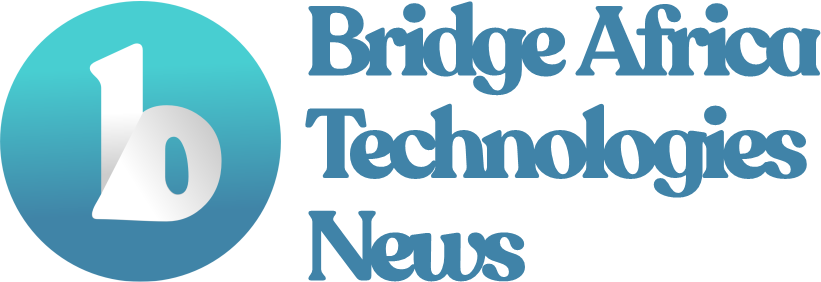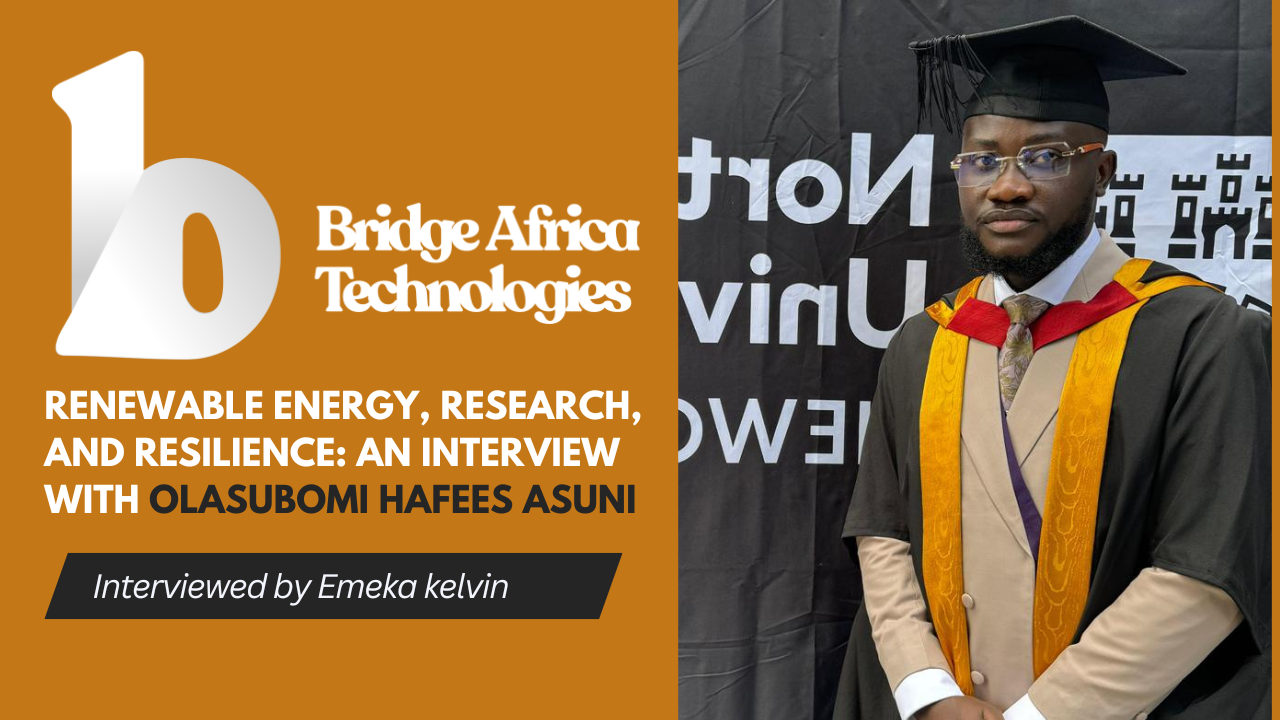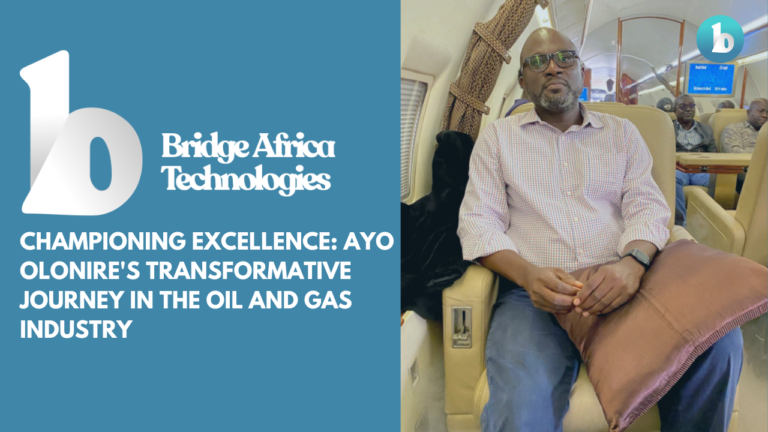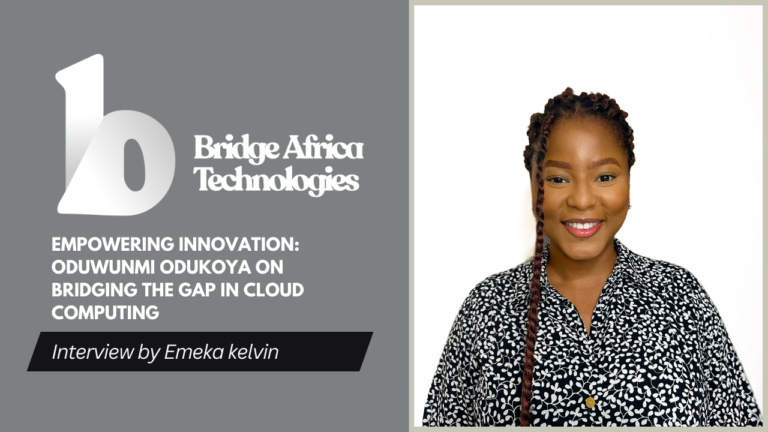“Access to clean energy is a fundamental right. My mission is to ensure that underserved communities are empowered through sustainable energy solutions.” —Olasubomi Hafees Asuni
Olasubomi Hafees Asuni is a highly skilled Renewable Energy Project Manager and Engineer with a strong dedication to advancing sustainable energy solutions. He holds a Master’s degree in Renewable and Sustainable Energy Technologies from Northumbria University, UK, and a Bachelor’s degree in Electrical Engineering from the University of Abuja, Nigeria, providing him with a solid academic foundation in his field.
With over five years of experience, Olasubomi has managed a variety of renewable energy projects, with a particular focus on solar energy, energy storage systems, and climate change mitigation. He is currently a Project Manager at Ambicorp International Services Limited, where he leads the design, implementation, and maintenance of solar energy systems. His efforts are geared toward enhancing energy access in underserved regions and retrofitting existing infrastructure to integrate renewable energy, thereby increasing resilience in disaster-prone communities.
Olasubomi is adept in Agile and Waterfall project management methodologies, with proven expertise in project scope development, budget estimation, and stakeholder engagement. His ability to navigate complex projects while ensuring timely and efficient delivery underscores his professional competence.
A testament to his impact in the field is his receipt of the prestigious BAT Award of Excellence in 2024, recognizing his contributions to renewable energy. Additionally, he has authored several influential research papers, including works on techno-economic analyses for CO2 absorption technologies and the integration of renewable energy into sustainable development. His publication, “Green Software Engineering Development Paradigm: An Approach to Sustainable Renewable Energy Future,” showcases his innovative approach to merging technology with sustainability.
Olasubomi’s unique strengths lie in his proactive problem-solving skills and his capacity to foster collaboration among diverse teams. As an active member of the American Solar Energy Society (ASES) and the International Solar Energy Society (ISES), he remains committed to driving the global adoption of renewable energy.

READ ALSO: BAT Most Influential Women In Tech In Nigeria 2024 -Awards
Hence, In this exclusive interview, we delve into the inspiring journey of Olasubomi Hafees Asuni. From his academic pursuits in Nigeria and the UK to his impactful projects and research contributions, Olasubomi shares insights into his work, achievements, and vision for a greener future. Join us as he reflects on his career, the challenges of advancing renewable energy, and his role in driving innovation in underserved communities.
Round Table Chat with an Industry Giant —Olasubomi Hafees Asuni
1. Can you share a bit about your journey from studying Electrical Engineering in Nigeria to specializing in Renewable Energy in the UK? What motivated this transition?
Olasubomi’s Response:
“My journey began with an innate curiosity about how energy systems function and their role in powering societies. During my undergraduate studies at the University of Abuja, I was fascinated by the challenges of energy access in Nigeria, particularly in rural and underserved areas. These experiences shaped my decision to pursue a Bachelor’s degree in Electrical Engineering, where I gained a solid foundation in power systems, electrical circuits, and energy technologies.
As I progressed, I realized that traditional energy sources were neither sustainable nor sufficient to meet the growing energy demands in Nigeria. The inefficiencies, frequent power outages, and environmental concerns made it clear that renewable energy held the key to a more sustainable future. This realization motivated me to advance my education and specialize in Renewable and Sustainable Energy Technologies at Northumbria University in the UK.
The transition to the UK allowed me to immerse myself in cutting-edge research and gain exposure to the latest renewable energy technologies. It was a pivotal moment in my career, as I not only deepened my technical expertise but also developed a global perspective on the energy challenges we face and the solutions needed to address them.”
2. What inspired you to focus specifically on solar energy and energy storage solutions?
Olasubomi’s Response:
“Growing up in Nigeria, I witnessed firsthand the untapped potential of solar energy. With abundant sunlight year-round, I saw an opportunity to harness this resource to address the persistent energy access challenges in my community. Solar energy is versatile, scalable, and environmentally friendly, making it an ideal solution for regions like ours.
Energy storage, on the other hand, is a critical component that enhances the reliability of renewable systems. Without proper storage solutions, the intermittent nature of solar power can limit its usability. I realized early on that the combination of solar energy and effective storage systems could provide a comprehensive solution to energy access issues.
Over the years, I have had the privilege of working on projects that integrate these two technologies. For example, I led a solar farm project that incorporated advanced storage solutions, ensuring consistent energy supply even during cloudy periods or at night. This focus has allowed me to contribute meaningfully to creating energy systems that are not only sustainable but also reliable.”
3. Can you describe some of the most impactful projects you have worked on and their outcomes?
Olasubomi’s Response:
“Every project I’ve worked on holds a special place in my career, but some stand out for their scale and impact. One of the most memorable was the deployment of a solar farm for an ICT center in Owan, Edo State, Nigeria. This project provided a reliable power source to support digital literacy programs, empowering the community with tools to improve education and economic opportunities.
Another impactful project was retrofitting existing streetlights in Alaka’s low-cost housing development to solar systems. This initiative improved safety and security in the area while reducing dependence on grid power. The success of these projects reinforced my belief in the transformative power of renewable energy and its ability to uplift communities.
Additionally, I worked on the decontamination of heavy fuel oil pipework at a brownfield development site in the Tees Valley, UK. This project demonstrated how renewable energy can intersect with environmental remediation efforts, showcasing the versatility and importance of sustainable energy solutions.”
4. You received the BAT Award of Excellence in 2024. How did it feel to be recognized, and what does this award mean to you?
Olasubomi’s Response:
“Receiving the BAT Award of Excellence was an incredible honor and a moment of deep reflection for me. It felt gratifying to have my efforts recognized on such a prestigious platform, especially in a field that I am so passionate about.
To me, this award symbolizes the collective impact of all the teams I’ve worked with, the communities we’ve served, and the innovations we’ve brought to life. It’s a reminder that renewable energy is not just about technology; it’s about people and the positive change we can bring to their lives.
This recognition also fuels my determination to push boundaries and continue advocating for sustainable energy solutions. It reminds me of the responsibility I have to inspire others and contribute to the global transition to cleaner energy.”
5. What was your experience like serving as a judge for the Dratech Hackathon in 2023? How does it align with your vision for renewable energy?
Olasubomi’s Response:
“Being a judge at the Dratech Hackathon in 2023 was a truly rewarding experience. It was inspiring to witness the creativity and innovation of young professionals and students as they tackled real-world energy challenges.
The event aligned perfectly with my vision for renewable energy because it highlighted the importance of collaboration and innovation in driving sustainable solutions. Many of the ideas presented during the hackathon were not only innovative but also practical, demonstrating how technology can bridge the gap in energy access, especially in underserved regions.
As a judge, I was particularly impressed by the emphasis on scalable solutions and the integration of emerging technologies like AI and IoT into renewable energy systems. It was a testament to the potential we have as a continent to lead the way in sustainable development. The experience reaffirmed my belief in empowering the next generation of leaders and innovators to create a greener future.”
6. What role do you think renewable energy plays in disaster-prone communities, and how have you contributed to this?
Olasubomi’s Response:
“Renewable energy plays a critical role in building resilience in disaster-prone communities. Unlike traditional energy systems, renewable solutions like solar and wind energy are decentralized, making them less vulnerable to infrastructure damage during disasters. They can provide immediate and reliable power, which is essential for emergency response and recovery efforts.
I’ve contributed to this by designing and implementing renewable energy systems that retrofitted existing infrastructure in such communities. For example, in a project aimed at improving resilience in disaster-prone regions, we integrated solar power systems that ensured uninterrupted energy supply to essential facilities like hospitals and emergency shelters. This not only addressed immediate energy needs but also created long-term sustainability for the community.”
7. Can you elaborate on your research work and its impact on the renewable energy field?
Olasubomi’s Response:
“My research has been focused on practical and innovative solutions to some of the most pressing challenges in renewable energy. One of my key studies was a techno-economic analysis of CO2 absorption technologies, which explored cost-effective ways to reduce carbon emissions. This research contributes to advancing carbon capture technologies, a crucial area for mitigating climate change.
Another significant contribution is my publication on the Green Software Engineering Development Paradigm, where I explored how sustainable practices in software development can support renewable energy systems. These studies are not just theoretical; they provide actionable insights that can influence policy, industry practices, and further research.
By sharing these findings through publications and conferences, I aim to inspire other professionals and contribute to the global discourse on sustainability.”
8. What are some of the key skills or methodologies that have helped you manage complex renewable energy projects?
Olasubomi’s Response:
“Successfully managing renewable energy projects requires a combination of technical expertise, organizational skills, and an adaptive mindset. Over the years, I have honed my proficiency in both Agile and Waterfall methodologies, which have been instrumental in managing diverse project demands effectively.
For instance, Agile allows me to break down complex projects into manageable tasks, enabling iterative development and quicker adaptation to changes. On the other hand, Waterfall is invaluable for projects requiring a more structured, sequential approach. Knowing when to use each methodology has been crucial in delivering projects within scope, on time, and on budget.
Additionally, my technical background in design and simulation tools such as AutoCAD, MATLAB, and ANSYS has allowed me to address engineering challenges proactively. These skills, coupled with strong communication and stakeholder engagement abilities, have ensured that I can bridge the gap between technical teams, clients, and project goals.”
9. You are a member of ASES and ISES. How has being part of these organizations shaped your career?
Olasubomi’s Response:
“Being a member of the American Solar Energy Society (ASES) and the International Solar Energy Society (ISES) has been invaluable for my professional growth. These organizations provide a platform to stay informed about the latest trends, technologies, and best practices in the renewable energy industry.
They also offer opportunities to network with leading experts and innovators from around the world. This global perspective has enriched my understanding of how renewable energy can be tailored to different contexts, whether in developed or developing regions.
Through my involvement, I’ve also contributed to discussions on policy frameworks and emerging technologies, which aligns with my goal of promoting renewable energy adoption on a larger scale. These memberships keep me motivated to stay at the forefront of the industry and continuously innovate.”
10. What is your vision for the future of renewable energy in Nigeria and Africa?
Olasubomi’s Response:
“I envision a future where renewable energy becomes the backbone of Africa’s energy infrastructure, providing reliable and sustainable power for all. This transformation is essential for addressing the continent’s energy poverty while driving economic growth and environmental conservation.
In Nigeria, I see immense potential for solar, wind, and hydropower to play a significant role in bridging the energy gap. However, achieving this vision requires a multi-faceted approach. We need increased investment in renewable energy projects, stronger policy support, and widespread education about the benefits of sustainable energy solutions.
My role in this vision is to continue developing and implementing projects that demonstrate the feasibility and impact of renewable energy. By focusing on community-based initiatives and advocating for policy changes, I hope to contribute to a greener and more sustainable future for Africa.”
11. How do your research interests and publications reflect your commitment to the renewable energy field?
Olasubomi’s Response:
“My research and publications are a direct reflection of my passion for advancing renewable energy solutions and addressing some of the most pressing challenges in the industry. I’ve always believed that research is the foundation for innovation, and it provides the tools and insights needed to drive impactful change.
For example, my postgraduate research focused on a techno-economic analysis of absorption carbon capture technology for CO2. This study provided valuable data on cost-effective ways to reduce carbon emissions, a critical aspect of combating climate change. Additionally, my work on the Green Software Engineering Development Paradigm explores how software development can be aligned with sustainable energy goals, demonstrating my interest in interdisciplinary solutions.
Beyond publishing my findings, I actively contribute as a peer reviewer for scientific journals. This role allows me to engage with cutting-edge research and ensure that high-quality studies shape the direction of our field. My research interests, such as solar and wind energy, energy storage, and emerging technologies, are deeply tied to my professional goals of promoting renewable energy adoption and sustainability.
Ultimately, these publications and research endeavors are my way of contributing to the global knowledge base while also inspiring others to think critically and creatively about renewable energy solutions.”
12. How do you balance the technical and human aspects of managing renewable energy projects?
Olasubomi’s Response:
“Balancing the technical and human aspects is critical to the success of any project. On the technical side, precision and expertise ensure that the systems we design and implement are efficient and reliable. This involves meticulous planning, simulation, and execution using the latest tools and technologies.
However, the human element is equally important. Understanding the needs of the communities we serve and engaging them in the process ensures that the solutions are impactful and well-received. For instance, during a solar energy project for a rural community, we held workshops to educate residents about the system and how to maintain it. This fostered trust and encouraged local ownership of the project.
I believe the key to achieving this balance lies in clear communication, active listening, and involving stakeholders at every stage of the project. It ensures that our technical solutions are aligned with the real-world needs of the people we aim to serve.”
13. What advice would you give to young Nigerians aspiring to build careers in renewable energy?
Olasubomi’s Response:
“Renewable energy is a field of immense potential, and I encourage young Nigerians to explore it with curiosity and determination. My advice would be to focus on continuous learning and skill development. There are numerous online resources, certifications, and degree programs that can provide the technical knowledge needed to excel in this field.
Additionally, seek mentorship from professionals already working in renewable energy. Mentorship can provide valuable insights and guidance, helping you navigate challenges and identify opportunities.
Most importantly, don’t be afraid to innovate and take risks. Africa’s energy challenges are unique, and solving them requires creative, localized solutions. By staying committed and leveraging your passion for sustainability, you can make a significant impact in this sector.”
14. What’s next for you in your career? Any specific goals or projects you’re excited about?
Olasubomi’s Response:
“Looking ahead, I’m eager to explore the integration of emerging technologies like artificial intelligence and IoT into renewable energy systems. These technologies have the potential to optimize energy production, improve efficiency, and enhance system reliability.
I am also passionate about policy advocacy. I aim to work with stakeholders to develop frameworks that support renewable energy investments and adoption in Nigeria and Africa as a whole.
Additionally, I am excited about mentoring the next generation of energy professionals. I believe in the power of knowledge-sharing and want to create opportunities for young talents to thrive in this field. Lastly, I plan to expand my impact by launching larger-scale projects that address energy access in underserved regions, contributing to sustainable development goals globally.”
Conclusion:
As we conclude this insightful interview with Olasubomi Hafees Asuni, it’s impossible not to be inspired by his dedication, ingenuity, and commitment to creating a more sustainable world. From his humble beginnings in Nigeria to his advanced studies in the UK and his groundbreaking contributions to renewable energy, Olasubomi exemplifies what it means to be a leader in his field.
Throughout our conversation, we explored his journey from a passionate engineering student to a seasoned Renewable Energy Project Manager. His impactful projects—ranging from deploying solar farms in rural communities to retrofitting urban infrastructure for renewable energy—highlight his technical expertise and his drive to bridge the gap in energy access, particularly in underserved regions. His research contributions, the prestigious BAT Award of Excellence in 2024 and role as a judge at the prestigious Dratech Hackathon underscore his commitment to innovation, mentorship, and fostering the next generation of leaders in renewable energy.
Recognized by Bridge Africa Technologies as one of the Nigerians excelling abroad, Olasubomi represents the potential of Nigerian talent on the global stage. His story is not just about professional accolades; it’s a reminder to young Nigerians that with determination, hard work, and a commitment to solving real-world problems, they too can make a significant impact.
As he continues to explore emerging technologies and advocate for policies that promote sustainability, Olasubomi’s vision for a greener, more equitable world serves as an inspiration for all aspiring innovators. His journey challenges us to think beyond limitations, embrace opportunities, and work toward a future where energy access and environmental sustainability are realities for everyone.
For the youth, his message is clear: Dare to dream, invest in learning, and let your passion lead you to make a difference. As Olasubomi has shown, the path may not always be easy, but the impact you leave behind can light the way for generations to come.




